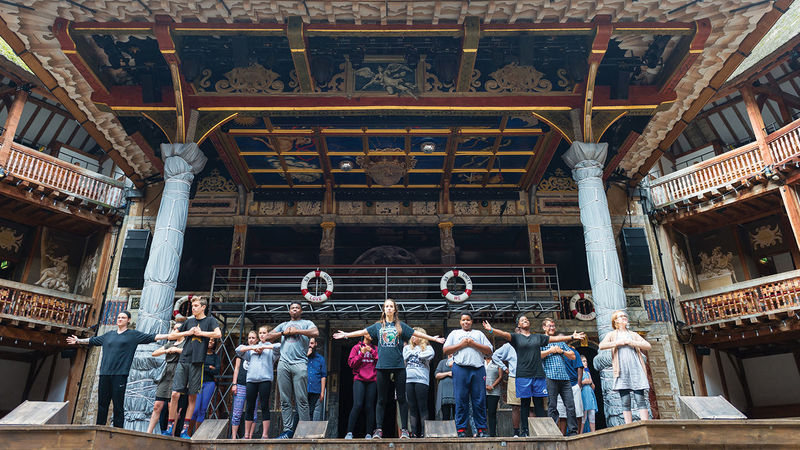The Empty Space
Stratford-upon-Avon, England
Their stage is grass, their sets a figment of the imagination. Trees frame their performance space under a canopy of leaves that rustle, like all the ambient noise around, at the unpredictable whim of forces beyond their control.
Wind and rain of English midsummer. Steam hissing from a coffee cart parked on the lawn. Children delighting in the thwack of mallets on croquet balls. Helicopters passing overhead. Double-decker tour buses, emblazoned with bright yellow lettering against fire-engine red, inching along the adjacent road.
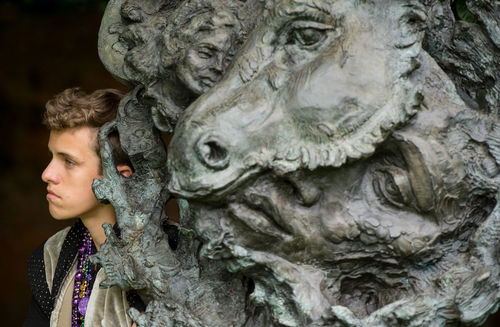 Cloten (Forest Wallace) awaits his entrance just off stage beside a statue at Shakespeare's New Place in Stratford-upon-Avon. Photos by Barbara Johnston.
Cloten (Forest Wallace) awaits his entrance just off stage beside a statue at Shakespeare's New Place in Stratford-upon-Avon. Photos by Barbara Johnston.
These wouldn’t be the best circumstances for the Robinson Shakespeare Company — drawn from participants in Notre Dame’s off-campus educational initiative, the Robinson Community Learning Center — to perform Cymbeline, except for one thing: Nowhere on earth could be better. For this acting troupe, 14 kids from ages 12 to 18 and each already a veteran of the Shakespearean stage, the soil equals Broadway plus the West End plus a time machine set to the turn of the 17th century.
They arrived in Stratford-upon-Avon in late July for the first leg of an eight-day England adventure steeped in history and culture. An itinerary full of VIP visits with eminent actors, directors and scholars here and in London, plus plans to take in four professional productions, make them feel like golden-ticket holders to a Shakespearean chocolate factory.
Two performances of their own in the Great Garden of what was once William Shakespeare’s estate are a highlight. Shakespeare owned this land for the last 19 years of his life. Some of his later plays, including Cymbeline, may have been written here. His birthplace and gravesite are each less than 10 minutes away on foot.
The historic echoes are so strong, the ghost of Shakespeare could be whispering his words in their ears. There’s also a matter of contemporary significance and immense personal meaning.
The Robinson Shakespeare Company is the first troupe to perform on this illustrious and fertile creative ground since it opened as a public landmark last year. It’s called New Place, as it was during Shakespeare’s time, with gardens, sculptures and exhibits that both respect and reimagine the unparalleled legacy connected to the landscape.
The old name and innovative vision reflect the Shakespeare Birthplace Trust’s dual objectives — to honor heritage and to foster creation — that extend literally to the roots of New Place. Mulberry trees propagated from those believed to be a gift to Shakespeare from King James I still bear fruit, enticing, nourishing — and staining.
Berry pickers among the Robinson troupe find their hands and arms streaked with reddish juice. They look like mutilated characters from Shakespeare’s early contribution to the horror genre, Titus Andronicus, a connection they’re quick to make.
It’s a play the Robinson company has never staged, and probably never will, but Titus Andronicus enthralls them. Year after year the kids beg their director, Christy Burgess, to let them perform it, a plea she bats away like an actor trained in stage combat. Too violent. Their parents would revolt.
This visit to Stratford-upon-Avon offers the next best thing — a chance to see the Royal Shakespeare Company’s current production in all its unrestrained gore. Hands and heads chopped off, a tongue cut out, murdered sons baked into a pie and fed to their mother. A woman in the audience faints, so authentic is the savagery, and the show exceeds the Robinson ensemble’s extraordinary expectations.
No such spectacle, bloody or otherwise, accompanies their performance of Cymbeline — although the Robinson actors do manage to play a decapitation for laughs. Without the resources of a professional theater, the ensemble has to conjure a world in the audience’s mind using virtually nothing but their emotional range.
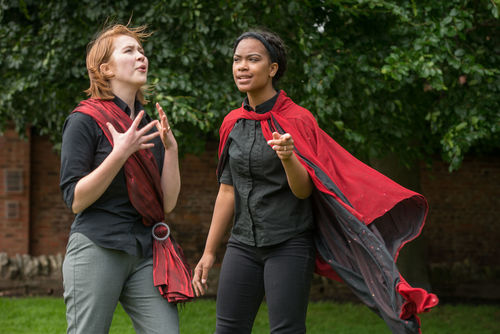 Posthumus (Ophelia Emmons), left, suffers over the purported proof of his wife's infidelity that Iachimo (Kennedi Bridges) brings from Britain.
Posthumus (Ophelia Emmons), left, suffers over the purported proof of his wife's infidelity that Iachimo (Kennedi Bridges) brings from Britain.
They don’t consider this a limitation. On the contrary, it’s the sort of performance Shakespeare himself would have recognized. In the playhouses of his time, as Bill Bryson writes in Shakespeare: The World as Stage, “Theaters had little scenery and no curtains . . . no way to distinguish day from night, fog from sunshine, battlefield from boudoir, other than through words.”
The Robinson Shakespeare Company’s spare approach has less in common with the blood-soaked production of Titus Andronicus they relish seeing in Stratford than with the haunting version director Peter Brook conceived in 1955. They learn about that revolutionary revival during a private presentation of items from the Shakespeare Birthplace Trust archives.
Brook alluded to the play’s barbaric vengeance without using graphic depictions. Ribbons draped amputated body parts. Eerie music shrouded the theater like fog, creating a psychological sensation of horror. Critics called it “full-blooded and bloodless” achieving a “dazzling simplicity out of a terrifying tawny darkness.”
The Robinson players don’t know this, but Brook’s book, The Empty Space, has had a major impact on them through its influence on Burgess, the director whose vision adds the color to their blank canvas. She’s a purist, reminding the actors again and again that “it’s not good Shakespeare” if they can’t achieve a play’s full comic or tragic effect wearing all black on a bare stage.
“This is from Peter Brook and his idea about minimalist Shakespeare,” Burgess explains as they browse the archival record of a like-minded legend. They peruse costume designs and photographs of Brook’s Titus Andronicus set. They even listen to a preserved sample of an ominous tinny plink from the production’s score, seldom heard by anyone except audiences at the time.
“You guys are also a product of Peter Brook,” Burgess says, “just being able to go out there and tell the story without elaborate sets, costumes or props.”
Their Stratford production of Cymbeline is a case in point. The settings of Britain and Rome, of royal court and rugged cave, all use the same available scenic backdrop, the brick wall that borders the Great Garden of Shakespeare’s New Place.
For this special occasion, the actors wear elegant new costumes from South Bend designer Chantelle Snyder, tote a few small props and employ the odd cosmetic touch. That’s about it.
Burgess applies a makeup beard and pencils on some eyebrow scruff for Lizzie Graff, a 12-year-old girl playing the banished warrior and kidnapper Belarius. Zion Williams, as the nefarious queen plotting to usurp the throne, wears sparkly pink lipstick that serves as a flashing neon warning sign of her character’s ill intent. And Forest Wallace flaunts his character Cloten’s misbegotten arrogance with a glinting thicket of Mardi Gras beads around his neck.
Otherwise unadorned, they prepare to do what they’ve been taught — to bring their story to life from the inside out, to transfix an audience with the power of Shakespeare’s words alone.
“Tell me a story,” Burgess says. “Take me on a journey.”
A boisterous warm-up routine prepares them vocally and emotionally. At the call of places, the Robinson ensemble members stride single-file through a heavy wooden gate into the Great Garden of Shakespeare’s New Place, toward the empty space they’ve come so far to fill.
Interacting
South Bend, Indiana
Burgess worried that she wouldn’t be able to cry every night. Her role as Hero in Much Ado About Nothing demanded tears, and she wondered how she could summon enough anguish, performance after performance, to make them real.
The trick? Working with Hana Lass as Beatrice, a fellow actor so committed to the moment, so full of outrage and pain over the fate befalling Burgess’ character, that it opened her own emotional spigot.
“All I had to do was look at her face,” Burgess says, and the sadness pooled in her eyes and spilled.
From that experience a dozen years ago, she learned that acting is a team sport, a lesson she relates to the Robinson Shakespeare Company’s cast of Cymbeline with increasing urgency during their final weeks of rehearsal before departing for England.
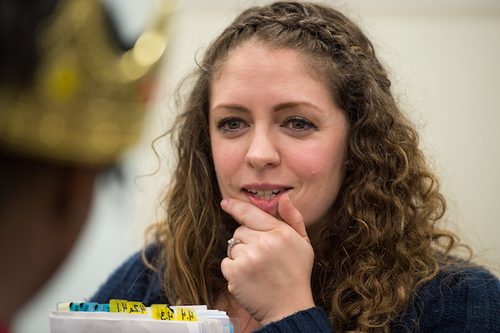 Director Christy Burgess works with the cast of Cymbeline in rehearsal.
Director Christy Burgess works with the cast of Cymbeline in rehearsal.
The young actors have drifted into their own heads, distracted with thoughts of their next line, hearing only their cues, as opposed to experiencing the unfolding fortunes of the people they’re portraying. Their characters grow more remote and isolated, siphoning life from the story. Scenes calcify into rote recitation.
Burgess urges them to replenish each other’s emotional reservoirs with the kind of generosity she received on stage, sharing empathetic feeling for each broken heart and duplicitous outrage, each covetous scheme and bellicose threat. In mid-July, less than three weeks before taking the Stratford stage, Burgess isn’t getting that from them at all. She’s getting “autopilot.”
It’s understandable why the preparations are going stale. Rehearsals for Cymbeline started in the winter, leading to two Washington Hall performances in May, which is the usual conclusion to the troupe’s process. Two months later, they’re still at it, familiarity drifting toward boredom.
Then again: nothing less than the opportunity of a lifetime awaits them. “The little Shakespeare company that could,” as Burgess calls the group she started at Notre Dame’s Robinson Community Learning Center in 2008 without much help or encouragement, has generated international interest, even becoming a grant-funded partner of the Shakespeare Birthplace Trust.
To the global community of Shakespeare producers and educators, the Robinson company represents the achievement of an elusive goal. The theater administrators and curriculum developers want to tap into what Burgess has inspired — an abiding, uniting interest in Shakespeare among young people who have little else in common.
Age, race, gender, religion and socioeconomic status differentiate but don’t separate these kids, their shared commitment to the troupe erasing any dividing lines. As ensemble member Andrew McDonald puts it, “I’ve heard a lot of times, make sure you float in different circles. Well, in this group, I’ve got about 36 different circles. Everybody floats within each other and nobody’s ever been rejected or pushed out.”
When personal problems flare up in their lives, the youngsters find escape and comfort inside the Robinson Center. Walking together as a group, older kids sometimes take the hands of younger ones, unremarked upon — and, among them, unremarkable — acts of tender guidance. They love each other and not only say so but explain why in detail during tear-jerking sessions called affirmations.
After representatives from the Birthplace Trust and Shakespeare’s Globe in London saw this in person last year during a conference at Notre Dame, they extended an almost instantaneous invitation to England. Now the time’s nearly upon them.
The privilege of performing on the land where Shakespeare cast his shadow adds a motivating elation to the drudgery of rehearsing, but also a draining tension. There’s a fine line between excitement and anxiety.
On a Monday afternoon in mid-July at an empty Washington Hall, the actors seem flattened under the strain of it all, delivering lines as if through cardboard masks of their characters. Newlyweds Imogen (Precious Parker) and Posthumus (Ophelia Emmons) sound no different in starry-eyed love, forlorn farewell or angry encounters with Iachimo (Kennedi Bridges), the strutting con man who would impugn their fidelity for a few ducats.
Later, when Imogen disguises herself as a man and goes missing in the woods, bemoaning an empty stomach and a broken heart, Burgess stops the monotone monologue. “Your hunger is the same as your love,” she tells Precious.
Andrew, playing one of King Cymbeline’s kidnapped sons, fidgets in the background during a revelatory scene. He’s a little distracted, and distracting, but Burgess deduces that he’s also twitchy with uncertainty about how to play the curiosity and shock as his character’s hidden history comes to light. She wants Andrew to experiment with reactions that feel natural, to choose instinct over inhibition, and to quit with the “potty dance.”
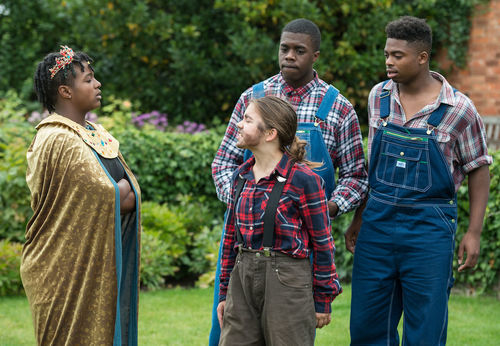 During a rehearsal of Cymbeline, Belarius (Lizzie Graff) informs King Cymbeline (Cameron Pierce) that he kidnapped his two sons, Arviragus (Josh Crudup) and Guiderius (Andrew McDonald).
During a rehearsal of Cymbeline, Belarius (Lizzie Graff) informs King Cymbeline (Cameron Pierce) that he kidnapped his two sons, Arviragus (Josh Crudup) and Guiderius (Andrew McDonald).
Burgess waves her hands over her head like she’s hoisting a sail. “Andrew, what am I doing?”
“Unraveling the rope constraining my psyche.”
Everybody’s too bound up right now, and Burgess tries to turn them all loose. After rehearsal, she gathers the performers for a quick refresher in the spirit of the enterprise, which is emphatically not about memorization and repetition. It’s about the alchemical transformation of those remembered words into the original utterances of real people, alive with desire and cruelty, pride and eccentricity. Cymbeline, a confounding play to categorize — tragedy, comedy, romance? — teems with personalities and personal journeys to depict.
“Have you ever had a play where you’ve had more juicy characters than you have now?” Burgess asks.
“No,” chants the cast.
“This is the juiciest, right?”
There’s “a father cruel and a step-dame false” and “a foolish suitor to a wedded lady,” and that’s just in King Cymbeline’s immediate family. Predatory scoundrels lurk to exploit the fissures in those distrustful relationships, to their shameful regret and even death. Britain and Rome brace for war as the decades-old toll of previous battles festers in the living memory of the wounded.
Cymbeline can’t be kept afloat with solitary acting. Only interacting elevates the story, listening and responding as if for the first time to each threat and accusation, each plea and revelation.
“Stop trying to do it by yourself,” Burgess says. “Get that energy from each other.”
Energy enough to jolt them out of the rut and shed new light on scenes they now know all too well. Their lines might be all but chiseled in stone, but the breath of life is in the delivery, in the harmony of voices singing an oldie but not trying to replicate the original.
“Every time we do it, it needs to be new, right? It needs to be fresh,” Burgess says. “You guys should be trying new things every day.”
The next day, she follows her own advice. The cast walks together from the Robinson Center on Eddy Street a couple blocks south of the Notre Dame campus toward Washington Hall for rehearsal. Along the way they stop at the courtyard outside the DeBartolo Performing Arts Center.
Here, she tells them, they can forget about stage directions, unburden themselves of the weight of the words and just inhabit the story in a way that feels most natural. Find new things. Refresh.
Burgess has other tactics too, like having the troupe rehearse their Cymbeline scenes as foot-stamping preschoolers, or moody teenagers, or Mafia-movie gangsters. Sometimes she flashes through categories in a matter of seconds, in the process allowing the cast to shed ingrained habits and discover surprising new elements to incorporate into their portrayals.
Glimmers of breakthroughs grow brighter. Burgess begins to see glimpses of what she’s been looking for, but the performers don’t want to hear that. They ask her to, please, keep her compliments to herself so they don’t succumb to cockiness or, worse, lull themselves into stagnation again trying to duplicate whatever earned her praise.
Burgess sort of obliges, her enthusiastic thumbs-up disguised as a so-so toggle of the hand.
“So mediocre!” she allows when Zion Williams adds a layer of ingratiating grease to the queen’s lies about her intentions in procuring a deadly poison.
“Totally passable!” she shrugs toward Savannah Dawson and Monica Caponigro, as attendants to the intolerable Cloten, for pretending to be sycophants to his face while snickering in secret-handshake mockery behind his back.
A couple of outdoor rehearsals and a performance in a South Bend park acclimate the cast to the environment they’ll experience in Stratford. The performers have to make themselves heard over grinding saws and revving trucks. Bouncing basketballs reverberate off a concrete court, flashing in and out of their peripheral vision from the corner of grass they claim as the stage.
Burgess is unsympathetic to any evidence of distraction. Performers must rise above the noise, in both temperament and volume, to seize an audience’s attention. A test of character in every sense of the term.
Debriefing afterward turns into a role reversal. Burgess loved the focus and energy, but the actors were less than impressed with themselves, as sure a sign as any that they’re ready to go.
Their Hour upon the Stage
Stratford-upon-Avon, England
Jump means clap. Clap means jump. Stop means go. Go means stop. Got it? Good. Now follow Gemma Fairlie’s directions.
“Go. Stop. Jump. Go. Stop. Clap. Jump. Clap. Go. Stop. Stop. Go. Jump. Clap. Go. Stop. Jump. Clap. Stop. Stop. Stop. Jump. Clap. Go. Stop stop. Go. . . .”
Scattered around a room at the Shakespeare Centre in Stratford-upon-Avon, the Robinson players try not to do as they’re told, or to do as they’re not told. Fairlie’s an award-winning British director whose litany of credits include staging a production of King Lear starring Ian McKellen, so she has their rapt attention.
With it, she’s turning them into just the muddle of stopping (going) jumping (clapping) confusion that she wants them to become. There’s magic in these mash ups.
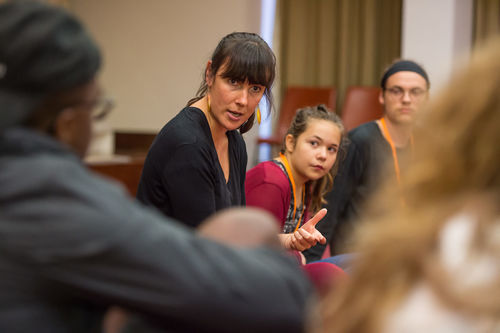 Director Gemma Fairlie leads a workshop for members of the Robinson Shakespeare Company.
Director Gemma Fairlie leads a workshop for members of the Robinson Shakespeare Company.
“Don’t worry about getting things right, OK?” Fairlie says, after the fact rather than as comforting prologue, referring to acting itself and not just this mind-bending exercise. “The key is to mess up. We hope that we will mess up because it’s actually in those mistakes that the most exciting things happen.”
In which case, the ensemble’s all-in embrace of their herky-jerk through Fairlie’s rigmarole can only be considered a rousing success. She also challenges them with more than the physical equivalent of tongue twisters.
There are a series of choosing-sides questions about subtle distinctions between concepts like honesty and honor, duty and loyalty, and sweeping moral surveys of justifications for violence and circumstances that warrant the ultimate personal sacrifice. The context is Julius Caesar, which Fairlie directed this year. Some of the yes-or-no judgments she asks them to make relate to characters or incidents in the play. Other questions are directed at them, personally.
Would you die for family? For country? Would you commit violence, or even kill, for people you love? For causes you support? Confronted with stark, absolute choices on complicated subjects, the young actors often hesitate to move to the designated yes or no sides of the room. They’re almost never unanimous, a testament to independent thinking and the complexity of the themes. It’s harder than jumping when told to clap.
All the mental and physical gymnastics that Fairlie puts them through represent a path from interpretation to transformation to declaration that shapes creative expression.
“As an artist that’s what you’re supposed to do,” she says, “to explore and examine the world, and figure out what you want to say about it, what you want to change about it, what you want to make better.” Fulfill that responsibility, Fairlie declares, and “theater is alive, theater is real, theater is juicy.”
Months of preparation in South Bend, and now enthusiastic instruction from acclaimed professionals such as Fairlie in Stratford, have ripened the Robinson players for their moment in the sun (weather permitting).
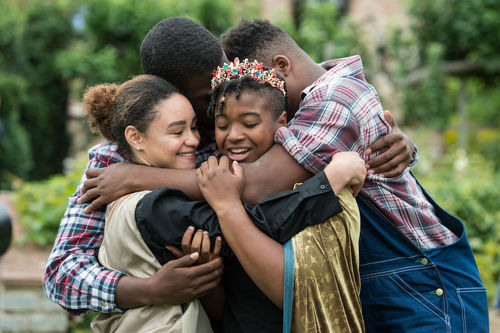 King Cymbeline (Cameron Pierce) reunites with his daughter Imogen (Precious Parker) and long lost sons Arviragus (Josh Crudup) and Guiderius (Andrew McDonald).
King Cymbeline (Cameron Pierce) reunites with his daughter Imogen (Precious Parker) and long lost sons Arviragus (Josh Crudup) and Guiderius (Andrew McDonald).
About two dozen people, some familiar faces, some not, await the start of Cymbeline on the lawn. After a brief introduction from Burgess, the first performance at Shakespeare’s New Place begins under a cloud. Light rain falls for a tense instant, then passes, leaving bright clear skies, symbolism that would have been a little too on the nose if it had been scripted.
Instead it’s just more of the impromptu magic accompanying the ensemble around England, this turn about the garden under the unexpected sun among the most luminous. No more burdensome weight affects the cast, only light.
From the resounding first lines — a too-subdued delivery was a recurring rehearsal concern — the acoustic performance sounds plugged in and turned up, the cast drawing energy from the setting and from each other. Together they infuse Cymbeline with its full scope of humor and rage, intrigue and retribution, sadness and joy. Kennedi Bridges embodies much of that in a single character.
Kennedi first appears on stage with a hip-swaying swagger as Iachimo, who connives his way into chains instead of riches and ends up on bended knee in a repentant appeal for his life.
“Killing it,” Burgess gushes under her breath during one of Kennedi’s scene-stealing turns.
Afterward, gathered in the conference room that serves as their backstage retreat, Burgess distributes more pithy phrases fit for a promotional poster. Precious Parker as Imogen? “Lovely.” Savannah and Monica as Cloten’s attending lords? “Saucy and hysterical.”
For Ophelia Emmons, who reached a new heart-rending level in her climactic scene? Just the mention of her name and a sweep of a hand in her direction inspires applause from around the room.
“I was so shook,” cast member Ellie Graff says. “It was so beautiful, Ophelia.”
Ophelia’s Posthumus trembles in gutted regret over his own responsibility for the loss of his wife, Imogen. Posthumus believes she’s dead and blames himself for it, remorse that so consumes Ophelia in that instant that the character chokes out the words through tears never shed before during that scene. The vulnerability of Posthumus, expressed through Ophelia’s triumphant portrayal at that emotional crest of the play, speaks with eloquence about how far this journey has taken the entire cast, how much they’ve discovered in their characters and in themselves.
The trip’s barely half over — they leave for London in the morning — but the performance in Stratford has already given the Robinson company’s England adventure the happiest of endings.
A Place of the Imagination
London, England
Crossing the threshold of the Globe Theatre feels like stepping through a portal from the current Elizabethan era into the previous one more than four centuries ago.
The building is just a replica that opened in 1997 and the artsy-touristy Bankside district along the River Thames bears no resemblance to what were disreputable outskirts of town during Shakespeare’s time. Inside, though, the Globe evokes sensations of what it must have felt like to be there when actor Richard Burbage originated the roles of Hamlet or Othello or King Lear that Shakespeare wrote for him.
A shiver of history courses through the Robinson players as the theater door thuds closed behind them and they take it all in for the first time. And the second time, and the third.
They’re actors, so they can handle the do-overs that an NBC crew asks of them to capture footage for one of those “Fighting For” ads that air during football games. Just crossing the footbridge over the river earlier in the morning required multiple takes — their entourage of director, producer, sound operator and rollerblading cameraman attracting the curiosity of passersby.
The repetition becomes a little tedious, but even take four or five of their “first” look at the Globe conveys much of the original’s awestruck authenticity.
“I didn’t expect to be so blown away by a theater,” ensemble member Cameron Pierce says later, the gale yet to subside.
“This wooden O,” as Shakespeare described it, rises with a cathedral’s vertical grandeur and envelops with a chapel’s snug intimacy. Sunlight streams over slanted thatch that lines the open roof illuminating the empty expanse that surrounds the stage where the groundlings stand for performances. Three tiers of bench seating arc around the structure, keeping everyone in a full house of 2,000 within about 40 feet of the stage.
The Robinson players, in a singular highlight of their visit, get to see the view from the actors’ perspective. Under the hypnotic direction of the theater’s Master of Movement, Glynn MacDonald, they gallop and twirl and stride around the Globe stage, learning how to inhabit and navigate the unusual space.
 Robinson Shakespeare Company ensemble members raise their swords during a movement workshop on the stage at Shakespeare's Globe in London.
Robinson Shakespeare Company ensemble members raise their swords during a movement workshop on the stage at Shakespeare's Globe in London.
In Shakespeare’s time, acoustics, not sightlines, determined the best seats. It was, in the words of a tour guide, “a place of the imagination rather than a visual one,” as it’s still meant to be, although now there are fewer limits on an audience’s sensory experience.
During their stay in London, the ensemble attends two shows here, Much Ado About Nothing in the rain and Twelfth Night — transported to revolutionary Mexico and the disco-fabulous 1970s, respectively. Globe artistic director Emma Rice’s vision, so fully realized in these splashy productions, has met with such resistance among the theater’s leadership that, despite popular and critical success in her first 18 months on the job, she’s out next year.
To the Robinson troupe, whose operating philosophy and budget make their performances more like the Globe of old, Rice’s grand theatrical pageants are mesmerizing. If not necessarily preferable.
Fresh from seeing Twelfth Night, abuzz over Rice’s fizzy retrofitting that includes showstopping drag queen Le Gateau Chocolat as the sage jester Feste, the Robinson players gather in a lecture hall at the Globe. Members of the theater’s staff — including, be still their starstruck hearts, Rice herself — join them to talk shop.
The conversation turns to elaborate adaptations of Shakespeare like they’ve seen the past two days, the likes of which they can hardly conceive of producing themselves. This is one of those multifaceted issues, with conflicting shades of opinion among and even within them. Entranced as they are with the wow-factor, they also have an affinity for the enduring power of Shakespeare’s words, unadorned.
Cameron, as dazzled at the kaleidoscopic Twelfth Night as she was on first sight at the empty Globe, takes up the question.
“I think that Shakespeare’s incredibly exciting when you add something new to it,” she says. “When you add incredible choreography with live music. And shipwrecks. And drag queens.”
There’s almost universal agreement, but Sha-Nia Clay pushes back a little in defense of simplicity. “Just us being our characters can make the whole story come alive.”
Josh Crudup, among those spellbound at the Twelfth Night spectacle, advances the idea. “We portray the set. It is amazing watching shipwrecks, but when you can make the audience envision a shipwreck with your voice, that’s a really beautiful thing.”
As an unplanned final act, the ensemble members are asked to give voice to Shakespeare’s words. Do any of them have monologues they’d like to perform for the group?
So many hands go up that there isn’t time to go one by one. The kids disperse around the room, each finding an intimate audience of two or three and begin all at once. The effect, at first, is cacophonous, words distinguishable only to the most attuned ears.
One at a time they finish, until only Precious Parker’s voice fills the room, as Queen Margaret in Henry VI, Part 3. Precious stands about where center stage would be if this were a theater, all the eyes trained on her like a spotlight while she throws sparks, as if fashioning a blade, from line after jagged line.
And will you pale your head in Henry’s glory,
And rob his temples of the diadem,
Now in his life, against your holy oath?
O, ’tis a fault too too unpardonable!
Off with the crown, and with the crown his head;
And, whilst we breathe, take time to do him dead.
As an ending — to the discussion, to the trip itself — it would be hard to improve on the crescendo of monologues to that punctuating apex and the applause from the Globe staff. Then life scripts something just a little bit better, an exit line from Emma Rice that exceeds any ovation.
“You are intoxicating,” she says, “and you’ve changed us.”
And the Robinson Shakespeare Company floats away on the exhilarating current of a flamboyant artist’s words alone.
Jason Kelly is an associate editor of this magazine. Email him at jkelly30@nd.edu.
